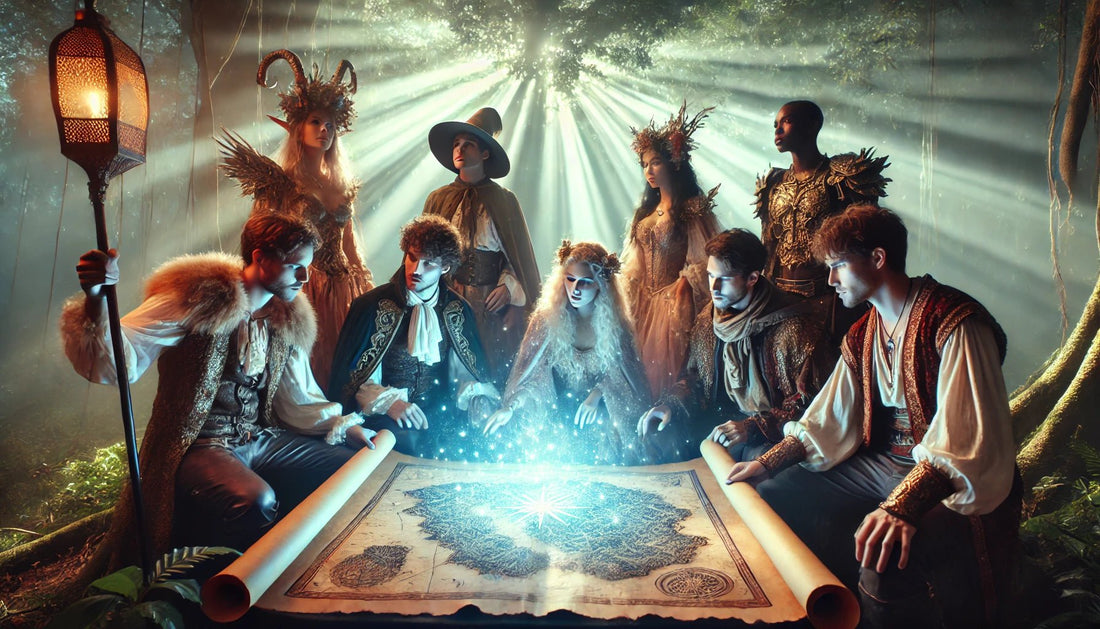
The Psychology of Role-Playing: Why We Love RPGs
Share
Chapter 1: A Portal to Other Realms
Once upon a time, in lands where dragons soared and wizards wielded mighty spells, there existed a gateway for mortals to traverse into these fantastical realms. This gateway, invisible yet omnipresent, was none other than the Role-Playing Game (RPG). From tabletop classics like Dungeons & Dragons to digital adventures in Skyrim, RPGs have become a beloved escape for many. But why do we so fervently cherish these roles we play? The answer lies deep within the caverns of our minds.
Chapter 2: The Allure of the Alternate Self
Role-playing games allow us to don identities far removed from our everyday selves. In the guise of a brave knight, a cunning rogue, or a wise mage, we explore facets of our personality that might remain dormant in daily life. Psychologists refer to this as "self-exploration." By stepping into another's shoes, we can experiment with different traits and behaviors without real-world repercussions. This freedom to explore alternate selves is both liberating and exhilarating.
Chapter 3: The Hero's Journey
At the heart of every great RPG is the Hero's Journey, a narrative arc that resonates deeply with the human psyche. Joseph Campbell's monomyth, or the Hero's Journey, describes a protagonist who embarks on an adventure, faces and overcomes adversity, and returns transformed. This narrative structure mirrors our own life challenges and triumphs, offering a sense of accomplishment and growth. In an RPG, players are not just passive observers but active participants, making their victories all the more meaningful.
Chapter 4: The Power of Community
One of the most enchanting aspects of RPGs is the community they foster. Whether it's a group of friends gathered around a table or an online guild embarking on a raid, RPGs create a sense of belonging. This camaraderie and shared purpose can be incredibly fulfilling. In the magical world of RPGs, social barriers dissolve, and players unite in their quest for adventure.
Chapter 5: The Enchantment of Escapism
Life, with its mundane routines and inevitable stresses, often makes us yearn for an escape. RPGs provide that enchanted escape, offering worlds where magic is real, and possibilities are endless. This escapism is not just a diversion but a psychological necessity, giving us a break from reality and a chance to recharge.
Chapter 6: The Cognitive Benefits
Beyond the thrill of adventure, RPGs offer cognitive benefits. Engaging in complex problem-solving, strategic planning, and creative thinking sharpens our minds. Players must think on their feet, adapt to new challenges, and collaborate with others, all of which enhance mental agility and social skills.
Chapter 7: The Emotional Connection
RPGs evoke powerful emotions, from the elation of a hard-won victory to the sorrow of a comrade's fall. These emotional experiences are profound because they are intertwined with our sense of identity within the game. As we invest emotionally in our characters and their stories, we develop a deep connection to the game and to the other players.
Chapter 8: The Art of Storytelling
At the core of every RPG is a rich tapestry of storytelling. Game masters and developers craft intricate plots, immersive worlds, and compelling characters that draw players into the narrative. This collaborative storytelling experience is unique to RPGs, allowing players to contribute to the unfolding tale and become part of the story's fabric.
Chapter 9: The Sense of Achievement
Completing quests, leveling up, and acquiring new skills in an RPG provide a tangible sense of achievement. These accomplishments, though virtual, satisfy our intrinsic need for progress and mastery. The feedback loop of effort and reward in RPGs mirrors real-life goals, providing motivation and satisfaction.
Chapter 10: The Magic of Imagination
Perhaps the most enchanting aspect of RPGs is the way they ignite our imagination. In a world where creativity is often stifled by routine, RPGs offer a sanctuary for our imaginative spirit. They encourage us to dream, to create, and to explore the boundless realms of our minds.
Conclusion: The Everlasting Quest
As we conclude our journey through the psychology of role-playing, it becomes clear why RPGs hold such a cherished place in our hearts. They are not merely games but gateways to other worlds, catalysts for self-exploration, and crucibles for forging bonds and memories. Whether we seek adventure, escape, or self-discovery, RPGs offer an everlasting quest that continues to captivate and inspire.
So, dear adventurer, the next time you embark on a role-playing adventure, remember the magic woven into every quest, character, and story. For in the world of RPGs, we are not just players but dreamers and heroes, forever questing in the realms of our imagination.
In this whimsical and insightful exploration, we've ventured into the psychological depths of why role-playing games enchant us. From the allure of alternate identities to the communal bonds forged in the fires of adventure, RPGs offer a magical blend of escapism, self-discovery, and cognitive enrichment. So grab your dice, don your cloak, and step into the enchanted realms where imagination reigns supreme.
